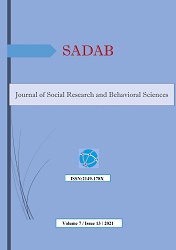Bazı İslami Dergiler Örnekleminde Carl Gustav Jung: Nitel Bir Araştırma
Carl Gustav Jung on the Sample of Some Islamic Journals: A Qualitative Research
Author(s): Beyazıt Yaşar SeyhanSubject(s): Contemporary Philosophy, Philosophy of Mind, Philosophy of Religion, Contemporary Islamic Thought, Ontology
Published by: SD Yayınevi
Keywords: Islamic Journals; Carl Gustav Jung; Jung's Views; The Jungian Phenomenon; The Collective Unconscious; Document Analysis;
Summary/Abstract: Even during the first establishment of the Republic (with the expression of Balaban), "the science of spirituality (=psychology) that talks about the spiritual existence of man" has always been interesting by the writers of that period. Especially since the 1940s, in some scientific, moral, religious and literary journals published in Turkey, the views of Western psychologists such as Carl Gustav Jung, who are famous in the psychology of religion, were explained. In this research, it has been tried to analyze how C. G. Jung and his views are handled in these journals. The journals discussed in the research are as follows: "Sebilürreşad", "Muslim Voice", "Tawhid", "New Ground", "Orbit", "Academy", "Young", "Cultural World", "Monthly" and "Kur'ani Hayat”. In our research, the approach to Jung and his views in these examined journals was investigated and some results were obtained. Accordingly, Jung has a positive phenomenon accepted by the Islamic community, as some Islamic journals acknowledge that Jung is different from their peers”. All Islamic journals used Jung. Although some criticize Jung to strengthen their own claims by pointing to Jung's authority, he used Jung to "guide his target audience" because he considered it closer to Islamic understanding than his Western counterparts. Islamic journals never used Jung's concepts of "persona", "anima-animus" and "self" in their articles. But they gave a lot of place to Jung's concepts such as "religion", "God", "archetype" and "collective unconscious". Especially since they see the concept of “collective unconscious” as an Islamic value, they have embraced it more. Islamic journals acknowledge Jung as the "authority". While this "authority" is the "strengthener" of its own claims based on some Islamic journals, it is a "model" for some Islamic journals whose aspects should be taken in accordance with their worldview. It is clear that Islamic journals do not have a scientific style and purpose when using Jung. It was concluded that Islamic journals approached Jung's concepts in the form of "ethnocentric" and "circular reasoning". It has emerged that Islamic journals that act with the logic of "Take what works and leave what does not work" and those who defend Islamic psychology are similar to the logic of "take the positive side of the West that fits the Islamic perspective" to Jung and his views.
Journal: Sosyal Araştırmalar ve Davranış Bilimleri
- Issue Year: 7/2021
- Issue No: 14
- Page Range: 55-114
- Page Count: 60
- Language: Turkish

